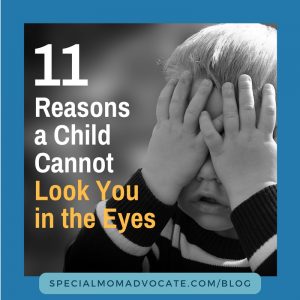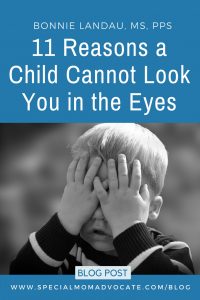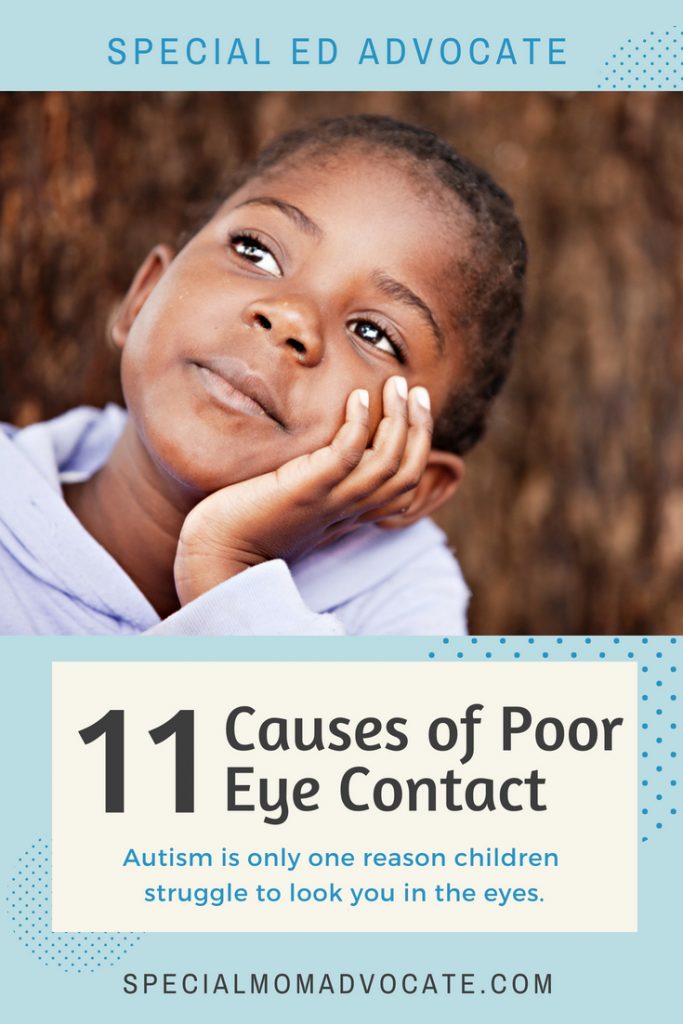 Most people assume if a person has trouble looking you straight in the eye, he must have autism. This is plain not true, and I wish people would stop with the armchair diagnosis when it comes to this social skill.
Most people assume if a person has trouble looking you straight in the eye, he must have autism. This is plain not true, and I wish people would stop with the armchair diagnosis when it comes to this social skill.
I want to share the very many reasons people will avoid eye contact during conversations. I think this is important because so many people stereotype this behavior and make an erroneous assumption about a person’s neurological function.
The truth is, making eye contact connects you with other people.
In many ways this connection can feel very uncomfortable. There is the saying, “the eyes are the windows of the soul,” and you can see and reveal a lot just through looking a person in the eye. For some people this window is too bright, and they must avert their gaze. Alternatively, they may not want to reveal what their eyes say behind their words.
11 Reasons a Child Cannot Look You in the Eyes:
 1. Social Anxiety
1. Social Anxiety
He may just be plain afraid to connect with you. Concerns about making a social faux pau, or even not knowing what to say, can cause social anxiety. If a person’s social anxiety has a severe affect on their ability to interact with others, they may consider consulting a psychologist to see if they can get some help for i.
2. Low Self-Esteem
This could be the root cause of the social anxiety, but essential the person does not feel worthwhile enough to participate in a conversation with you. She will often look at the ground rather than the people around her, and she will say very little.
3. Difficulty Focusing
Individuals who have a hard time focusing will frequently shift their gaze during conversations. Whether it is a visual processing issues that impedes fixation of the eyes, or an attention problem that causes distractibility, eye gazing can be a very difficult task to achieve.
4. Auditory Processing Issues
Auditory Processing is when the brain interprets what the ears hear. When it is impaired is can significantly impact social interactions, often leaving the individual confused or embarrassed by their inability to interpret what is being said. To compensate people with auditory processing issues will often look at your mouth to figure out what you are saying. They also may look at a fixed object to avoid visual distractions so they can focus harder on auditory input.
5. Hiding Emotions
Our eyes say so much about what we are feeling, and it is impossible to hide the minute changes in our brow, cheeks and eye shape. Eye contact is often avoided when emotions are overwhelming and person does not want that revealed in the course of the conversation.
6. Cultural Differences
In some cultures, particularly Asian cultures, eye contact can be seen as a sign of disrespect. To look at someone directly can be considered bold or defiant, so it is avoided.
7. She Has a Crush on You
Crushes can be the most wonderful feelings in the world, but having a conversation with someone you like can feel awkward and difficult. It’s usually because we are afraid we might do or say something stupid and embarrass ourselves.
8. Thinking About Something
Sometimes during conversations our minds wander (yes, we all do it!). It’s an unavoidable side affect of being a thinking being. When this happens, sometimes we avert our gaze to help us delve deeper into these distracting thoughts. We might drift into a sort of daydream, until the person we are talking to pulls us back to reality.
9. They Don’t Want to Talk Anymore
How do you end a conversation when the person does not hear your words that you need to go? With non-verbal cues, of course. We use our body to communicate a lot of information during interactions, and looking away is a non-verbal signal that we are no longer interested in this conversation. Pay attention to the next time you are talking and the person keeps looking at anything but you. Have they given you the signal that it is time to move on?
10. You have something on your face
Perhaps it’s a zit, a scar or maybe you didn’t use a napkin after lunch. Whatever the case, the person may find it uncomfortable to look at you and they are too embarrassed to say anything.
11. They are lying about something
Some people are consummate liars and this isn’t an issue, but most people feel guilty about lying. This guilt creates worry, and that is shown in our eyes. So they avoid eye contact so you cannot see the anxious feelings around their words.
Why do people with autism avoid eye contact?
Contrary to popular belief, people with autism are not insensitive but over sensitive. They are hyper aware of what is going on around them, and sensory input can over be overwhelming. This can include emotional overwhelm.
For someone with autism, gazing at somebody’s eyes can create an intense intimacy that feels overwhelming. It’s not that they can’t do, it’s that they are overstimulated and their neurological system cannot cope. They must avoid or break the gaze in order to remain calm. Many people are uncomfortable with prolonged eye contact, but for people with autism the time to develop discomfort is shorter.
Research has also shown that individuals with autism have a hypersensitivity to the features in peoples faces. It actually overstimulates their amygdala, the emotional center of the brain. This visual overwhelm makes it uncomfortable for them to continue gazing on someone’s face. Some individuals have even reported physical discomfort when locking eyes, such as burning in the eyes or even a headache.
The Mighty posted an article where they asked 16 people with autism why it’s difficult to look people in the eyes. Their answers were very eye-opening (pun intended).
How do you help people with eye contact challenges?
In my work as a special education advocate and parenting coach, I know that teaching eye contact is not always straight forward. It means identifying the underlying cause of the problem, and so what is possible to fix it. If it is self esteem, you need to work on that. If you have anxiety, then use cognitive behavioral approaches to remediate that. And of course, if it is autism, I use Social Thinking, a special social skills training program to help them learn appropriate social interactions.
For kids who do not have autism, here are some websites I have found that have some reliable strategies to help understand and improve eye contact.
- Improve Your Social Skills: How to Make Eye Contact
- How to Make Eye Contact Without Feeling Awkward
- Learn to Make More Eye Contact With People
ABOUT THE AUTHOR:
Bonnie Landau is a professional counselor and holistic therapist in Ventura County, California. Her specialities include therapy for autism, therapy for ADHD, and therapy for parenting who have kids with autism or ADHD or other neurodivergence. She changed careers from graphic design to counseling with the goal of helping struggling parents of kids with ADHD, autism, or other neurodivergence find strategies and solutions to help their children succeed. Bonnie is also the author of Special Ed Mom Survival Guide: How to Prevail in the Special Education Process and Find Life-long Strategies for You and Your Child.



